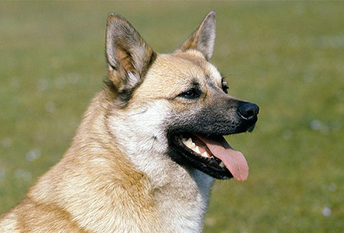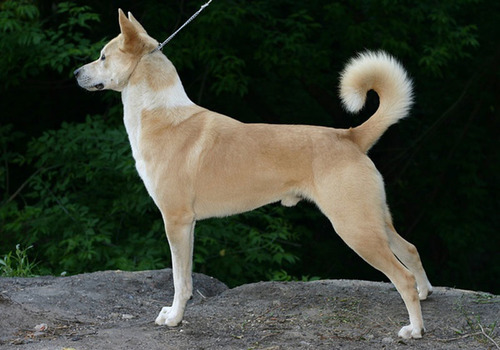If you want a medium-size dog with an easy-care coat, the Canaan is one to consider. He has a double coat, but little brushing is required to keep it in good condition. Give it a weekly going over with a rubber curry brush or hound mitt to remove dead hair and distribute skin oils.
Shedding is minimal during most of the year. Twice a year, the Canaan undergoes a heavier shed, and more frequent brushing is necessary during that time. Bathe him only as needed.
Check the ears on a weekly basis for signs of infection, irritation, or wax build up. Cleanse regularly with a veterinarian-approved cleanser and cotton ball. Brush the teeth at least once per week to prevent tartar buildup and fight gum disease. Additionally, nails should be trimmed once per month if the dog does not wear down the toenails naturally.
Canaans are a highly energetic breed and owners should provide their dogs with enough exercise to drain these energy levels each day. When denied an outlet to release their pent up energy, Canaans can become restless and develop various behavioral issues.
With this said, Canaan puppies should not be given too much exercise because their joints and bones are still growing and too much pressure on them could result in causing a dog a few problems later on in their lives. They should not be allowed to jump up or off furniture nor should they be allowed to run up and down the stairs because this puts too much pressure on their still growing joints and limbs.
If you get a Canaan puppy from a breeder, they would give you a feeding schedule and it's important to stick to the same routine, feeding the same puppy food to avoid any tummy upsets. You can change a puppy's diet, but this needs to be done very gradually always making sure they don't develop any digestive upsets and if they do, it's best to put them back on their original diet and to discuss things with the vet before attempting to change it again.
Older dogs are not known to be fussy or finicky eaters, but this does not mean you can feed them a lower quality diet. It's best to feed a mature dog twice a day, once in the morning and then again in the evening, making sure it's good quality food that meets all their nutritional requirements.
Learn about which human foods are safe for dogs, and which are not. Check with your vet if you have any concerns about your dog’s weight or diet. Clean, fresh water should be available at all times. Like many large breeds, Saint Bernard can experience bloat, a life-threatening condition where the stomach distends and twists. The causes of bloat aren’t fully understood, but experts agree that multiple, small meals per day and preventing vigorous exercise around mealtimes may help reduce the chances of it happening.
The average life span of the Canaan Dog is 12 to 15 years. The Canaan Dog is generally healthy and has a small group of dedicated breeders who communicate with each other regularly and work together for the betterment of the breed. As with all breeds, a Canaan Dog’s ears should be checked regularly for signs ofinfection, and theteethshould be brushed often, using a toothpaste designed for dogs.
Wonderfully sensitive, affectionate, and responsive, Canaan Dogs make devoted family companions. They are highly intelligent and readily trained.
Although the dogs are adaptable to most climates and living situations, their natural drive for self-preservation and a well-developed sense of territory make them mistrustful of strange people, strange dogs, and new environments; earlysocializationandpuppy training classesare a must.
This is a process that should begin with the breeder and continue with the new owner and helps to ensure a well-mannered and well-adjusted dog both at home and in public. Training sessions should always be positive; harsh training methods will have a negative effect on the Canaan’s sensitive nature.
Puppies should be properly socialized to develop the amiable, outgoing personality that is characteristic of the breed. They’re successful in performance and companion events such as earthdog, barn hunt, obedience, and agility.











